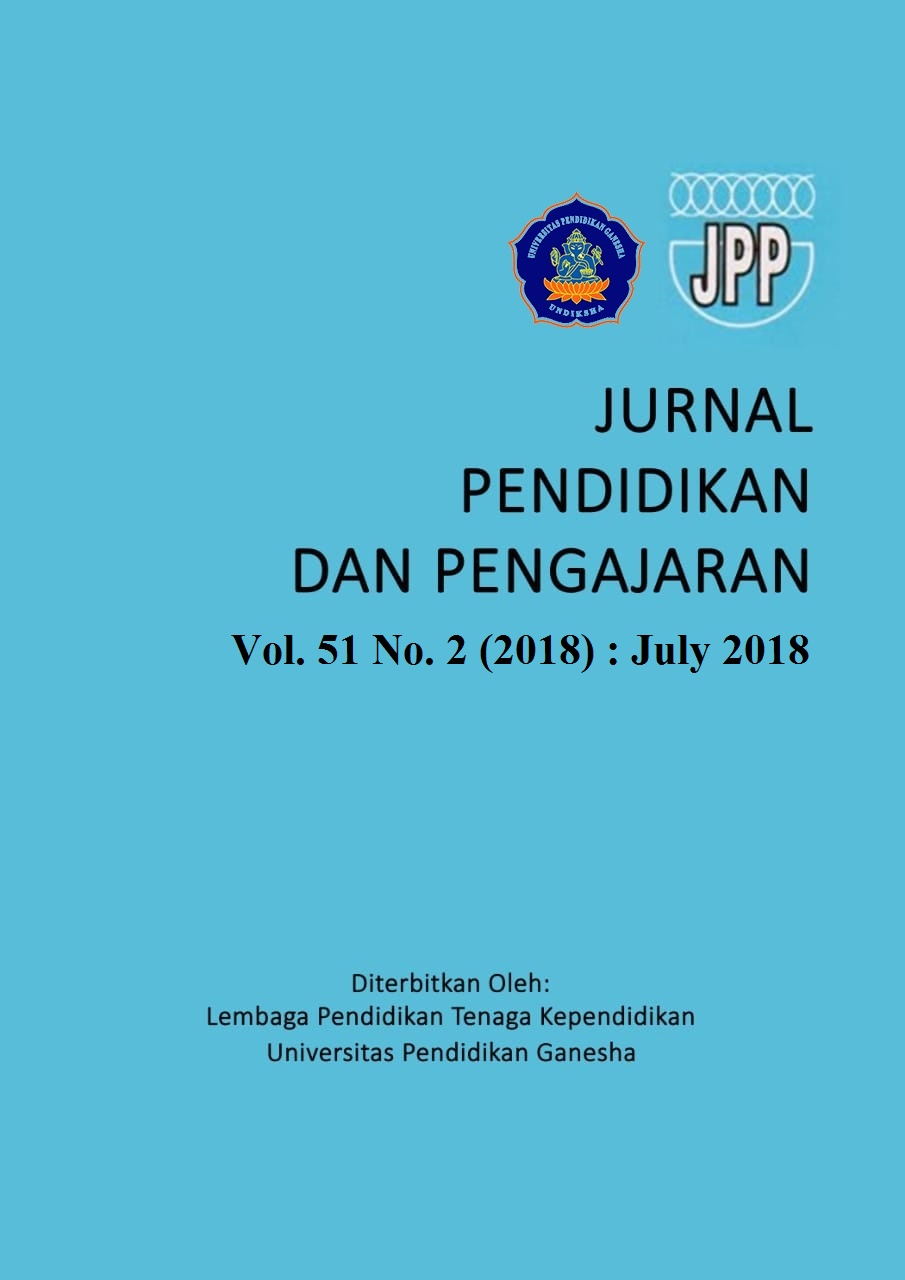Student teams achievement divisions (STAD) to enhance learning outcome
DOI:
https://doi.org/10.23887/jpp.v51i2.15416Kata Kunci:
STAD, learning outcomes, primary schoolAbstrak
This study aimed at determining the increase in students’ learning outcomes in social science by applying the student teams achievement divisions (STAD) model with the steps based on Curriculum 2013. This research was a type of a classroom action research which was conducted in two cycles in 33 fourth grade students in a primary school in Salatiga in second semester of academic year 2017/2018. Data was collected using test and non-test techniques with help of evaluation test and an observation sheet. Results show improvement of learning outcomes by applying STAD model on social science subjects. The average completeness of learning outcomes increased from pre-cycle to cycle II. At pre cycle, the average was 57.71 with 31,42% completeness, at cycle I was 68.28 with 50% completeness, and cycle II was 70 with 71.87% completeness. Therefore, applying the STAD model can improve the learning outcomes of primary students in social science.Referensi
Bryant, R. R. (1983). Effects of team-assisted individualization on the attitudes and achievement of third, fourth and fifth grade students of mathematics. Dissertation Abstract International, 43(1), 70.
Dwipayanti, N. A., Sudhita, I. W. R., & Parmiti, D. P. (2013). Pengaruh Model Pembelajaran Addie Berbantuan Media Konkret Terhadap Hasil Belajar Ipa Siswa Kelas V SD Negeri 1 Pangkungparuk. MIMBAR PGSD, 1(1).
Johnson, D. W., Johnson, R. T., & Stanne, M. B. (2000). Cooperative learning methods: A meta-analysis.
Lubis, A. (2012). Pengaruh Model Pembelajaran Kooperatif Tipe STAD Terhadap Hasil Belajar Fisika Siswa Pada Materi Pokok Gerak Lurus di Kelas X SMA Swasta UISU Medan. Jurnal Pendidikan Fisika, 1(1), 27–32.
Rattanatumma, T. (2016). Assessing the Effectiveness of STAD Model and Problem Based Learning in Mathematics Learning Achievement and Problem Solving Ability. Journal of Education and Practice, 7(12), 194–199.
Slavin, R. E. (1980). Cooperative Learning. Review of Educational Research, 50(2), 315–342. https://doi.org/10.3102/00346543050002315
Slavin, R. E. (1990). Cooperative learning: Theory, research, and practice. Prentice-Hall,.
Suyono, S., & Hariyanto, H. (2011). Belajar dan Pembelajaran Teori dan Konsep Dasar. Bandung: PT Remaja Rosda.
Taniredja, T., Faridli, E. M., & Harmianto, S. (2011). Model-model pembelajaran inovatif. Alfabeta.
Tran, V. D. (2013). Effects of Student Teams Achievement Division ( STAD ) on Academic Achievement , and Attitudes of Grade 9th Secondary School Students towards Mathematics. International Journal of Science, 2, 1–15.
Van Wyk, M. M. (2010). Do Student Teams Achievement Divisions Enhance Economic Literacy? An Quasi-experimental Design. Journal of Social Sciences, 23(2), 83–89. https://doi.org/10.1080/09718923.2010.11892815
Vaughan, W. (2002). Effects of cooperative learning on achievement and attitude among students of color. Journal of Educational Research, 95(6), 359–364. https://doi.org/10.1080/00220670209596610
Wardani, N. S., Winanto, A., & others. (2012). Asesmen Pembelajaran SD: Bahan Belajar Mandiri. Widya Sari.
Wyk, M. M. van. (2011). The Effects of Teams-Games-Tournaments on Achievement, Retention, and Attitudes of Economics Education Students. Journal of Social Sciences, 26(3), 183–193. https://doi.org/10.1080/09718923.2011.11892895
Zakaria, E., Chin, L., & Daud, Y. (2010). The Effects of Cooperative Learning on Students’ Mathematics Achievement and Attitude towards Mathematics. Journal of Social Sciences, 6(2), 272–275. https://doi.org/10.3844/jssp.2010.272.275
Unduhan
Diterbitkan
Cara Mengutip
Terbitan
Bagian
Lisensi
Authors who publish with Jurnal Pendidikan dan Pengajaran agree to the following terms:- Authors retain copyright and grant the journal the right of first publication with the work simultaneously licensed under a Creative Commons Attribution License (CC BY-SA 4.0) that allows others to share the work with an acknowledgment of the work's authorship and initial publication in this journal
- Authors are able to enter into separate, additional contractual arrangements for the non-exclusive distribution of the journal's published version of the work (e.g., post it to an institutional repository or publish it in a book), with an acknowledgment of its initial publication in this journal.
- Authors are permitted and encouraged to post their work online (e.g., in institutional repositories or on their website) prior to and during the submission process, as it can lead to productive exchanges, as well as earlier and greater citation of published work. (See The Effect of Open Access)





